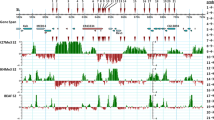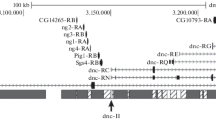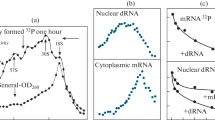Abstract
The protein D1 was obtained from nuclei of Drosophila melanogaster embryos and purified by perchloric acid fractionation and preparative gel electrophoresis. In nuclei its amount is approximately 1% of the amount of DNA by weight. D1 is soluble in 5% perchloric acid and extractable from nuclei by solutions of moderate ionic strength (0.35 M NaCl). Amino acid analysis shows that it is rich in both basic (20%) and acidic (27%) aminoacids. In all these properties D1 resembles HMG proteins (high mobility group; Johns et al., 1975) of vertebrates; however, its apparent molecular weight (∼50,000) is much higher. The distribution of D1 in salivary gland polytene chromosomes was investigated by immunofluorescence. Two levels of fluorescence intensity were observed: 1) Very bright fluorescence at chromosomal positions 81F, 83E, 101F, 102C and 102F; these sites are shown, by double labeling techniques, to coincide with quinacrine bright sites. 2) Medium to low fluorescence at many sites widely distributed throughout all chromosomes. In order to interpret these results and to relate them to the in vivo distribution of D1, we have investigated the pattern of immunofluorescence staining as a function of the methods of chromosome preparation and salivary gland fixation. The immunological specificity of the anti-D1 serum was studied by comparing its reactivity with D. melanogaster and D. virilis chromosome spreads and whole salivary glands, and by using reagents that minimize non-specific antibody interactions. We conclude that Dl is widely distributed throughout cytoplasm and nucleus, present in many chromomeres but most abundant in chromosomal sites that contain the AT-rich satellite DNA of density 1.672. This distribution, together with available evidence about the nucleotide sequences present in this satellite, suggests that D1 binds preferentially to chromatin containing sequences AATAT and/or AATATAT.
Similar content being viewed by others
References
Adkisson, K.P., Perrault, W.J., Gay, H.: Differential fluorescent staining of Drosophila chromosomes with quinacrine mustard. Chromosoma (Berl.) 34, 190–205 (1971)
Baker, C., Isenberg, I., Goodwin, G.H., Johns, E.W.: Physical studies of the nonhistone chromosomal proteins HMG-1 and HMG-2. Biochemistry 15, 1645–1649 (1976)
Barr, H.J., Ellison, J.R.: Ectopic pairing of chromosome regions containing chemically similar DNA. Chromosoma (Berl.) 39, 53–61 (1972)
Botchan, M., Kram, R., Schmid, C.W., Hearst, J.E.: Isolation and chromosomal localization of highly repeated DNA sequences in Drosophila melanogaster. Proc. nat. Acad. Sci. (Wash.) 68, 1125–1129 (1971)
Bram, S., Tougard, P.: Polymorphism of natural DNA. Nature (Lond.) New Biol. 239, 128–131 (1972)
Bridges, C.B.: Salivary chromosome maps. J. Hered. 26, 60–64 (1935)
Brutlag, D., Appels, R., Dennis, E.S., Peacock, W.J.: Highly repeated DNA in Drosophila melanogaster. J. molec. Biol. 112, 31–47 (1977)
Brutlag, D.L., Peacock, W.J.: Sequences of highly repeated DNA in Drosophila melanogaster. In: The eukaryote chromosome (W.J. Peacock and R.D. Brock, eds.), p. 35–64 Canberra: Australian National University Press 1975
Cohen, L.H., Gotchel, B. V.: Histones of polytene and nonpolytene nuclei of Drosophila melanogaster. J. biol. Chem. 246, 1841–1848 (1971)
Denell, R.E.: The genetic analysis of a uniquely dose-sensitive chromosomal region of Drosophila melanogaster. Genetics 84, 193–210 (1976)
Dutrillaux, B., Lejeune, J.: Sur une nuvelle technique d'analyse du caryotipe humain. C.R. Acad. Sci. (Paris), 272, serie D, 2638–2640 (1971)
Elgin, S.C.R., Bonner, J.: Partial fractionation and chemical characterization of the major nonhistone chromosomal proteins. Biochemistry 11, 772–781 (1972)
Ellison, J.R., Barr, H.J.: Differences in the quinacrine staining of the chromosomes of a pair of sibling species: Drosophila melanogaster and Drosophila simulans. Chromosoma (Berl.) 34, 424–435 (1971)
Ellison, J.R., Barr, H.J.: Quinacrine fluorescence of specific chromosome regions. Chromosoma (Berl.) 36, 375–390 (1972)
Endow, S.A., Polan, M.L., Gall, J.G.: Satellite DNA sequences of Drosophila melanogaster. J. molec. Biol. 96, 665–692 (1975)
Franco, L., Montero, F., Rodriguez-Molina: Purification of the histone HI from the fruit fly Ceratitis capitata. FEBS Letters 78, 317–320 (1977)
Gall, J.G., Atherton, D.D.: Satellite DNA sequences of Drosophila melanogaster. J. molec. Biol. 85, 633–644 (1974)
Gall, J.G., Cohen, E.H., Atherton, D.D.: The satellite DNAs of Drosophila virilis. Cold Spr. Harb. Symp. quant. Biol. 38, 417–421 (1974)
Gall, J.G., Cohen, E.H., Polan, M.L.: Repetitive DNA sequences in Drosophila. Chromosoma (Berl.) 33, 319–344 (1971)
Goodwin, G.H., Johns, E.W.: Isolation and characterization of two calf-thymus chromatin nonhistone proteins with high contents of acidic and basic amino acids. Europ. J. Biochem. 40, 215–219 (1973)
Hochman, B.: The fourth chromosome of Drosophila melanogaster. In: The genetics and biology of Drosophila (M. Ashburner and E. Novitski, eds.), pp. 903–925. New York: Academic Press (1976)
Holmquist, G.: Hoechst 33258 fluorescent staining of Drosophila chromosomes. Chromosoma (Berl.) 49, 333–356 (1975a)
Holmquist, G.: Organization and evolution of Drosophila virilis heterochromatin. Nature (Lond.) 257, 503–506 (1975b)
Hopgood, M.F., Ballard, F.J., Reshef, L., Hanson, R.W.: Synthesis and degradation of phosphoenolpyruvate carboxylase in rat liver and adipose tissue. Biochem. J. 134, 445–453 (1973)
Johns, E.W.: Studies on histones. 7. Preparative methods for histone fractions from calf thymus. Biochem. J. 92, 55–59 (1964)
Johns, E.W., Goodwin, G.H., Walker, J.M., Sanders, C.: Chromosomal proteins related to histones. In: Structure and function of chromatin (Ciba Foundation Symp. 28, new series). Amsterdam: Assoc. Sci. Publishers 1975
Keeppy, D.O., Denell, R.E.: A mutational analysis of the triplolethal region of Drosophila melanogaster. Genetics 91, 421–441 (1979)
Laemmli, U.K.: Cleavage of structural proteins during the assembly of the head of bacteriophage T4. Nature 227, 680–685 (1970)
Leeman, U., Ruch, F.: Selective excitation of Mithramycin or DAP1 fluorescence on double stained cell nuclei and chromosomes. Histochemistry 58, 329–334 (1978)
Lefevre, G.: A photographic representation and interpretation of the polytene chromosomes of Drosophila melanogaster salivary glands. In: The genetics and biology of Drosophila (M. Ashburner and E. Novitski, eds.), Vol. 1 a, pp. 32–64. New York: Academic Press 1976
Leibovitch, B.A., Belyaeva, E.S., Zhimulev, I.F., Khesin, R.B.: Comparison of in vivo and in vitro RNA synthesis on polytene chromosomes of Drosophila. Chromosoma (Berl.) 54, 349–362 (1976)
Leibovitch, B.A., Gvozdev, I.F., Zhimulev, I.F., Belyaeva, E.S.: Disproportionate incorporation of 3H-UTP and 3H-ATP in some regions of D. melanogaster salivary chromosomes in E. coli RNA polymerase reaction mixture. Dros. Inf. Serv. 51, 79–80 (1974)
Levy-Wilson, B., Dixon, G.H.: Limited action of micrococcal nuclease on trout testis nuclei generates two mononucleosome subsets enriched in transcribed DNA sequences. Proc. nat. Acad. Sci. (Wash.) 76, 1682–1686 (1979)
Lindsley, D.L., Sandler Baker, B.S., Carpenter, A.T.C., Denell, R.E., Hall, J.C., Jacobs, P.A., Miklos, G.L.G., Davis, B.K., Gethmann, R.C., Hardy, R.W., Hessler, A., Miller, S.M., Nozawa, H., Parry, D.M., Gould-Somero, M.: Segmental aneuploidy and the genetic gross structure of the Drosophila genome. Genetics 71, 157–184 (1972)
Luck, J.M., Rasmussen, P.S., Satake, K., Tsvetikov, A.N.: Further studies on the fractionation of calf thymus histone. J. biol. Chem. 233, 1407–1414 (1958)
Marushige, K., Dixon, G.H.: Transformation of trout testis chromatin. J. biol. Chem. 246, 5799–5805 (1971)
Matsubara, H., Sasaki, R.: High recovery of tryptophan from acid hydrolysates of proteins. Biochem. biophys. Res. Comm. 35, 175–181 (1969)
Mayfield, J.E., Ellison, J.R.: The organization of interphase chromatin in Drosophilidae. The self adhesion of chromatin containing the same DNA sequence. Chromosoma (Berl.) 52, 37–48 (1975)
Moore, S.: On the determination of cysteine as cysteic acid. J. biol. Chem. 238, 235–238 (1963)
Moore, S., Stein, W.H.: Chromatographic determination of amino acids by the use of automatic recording equipment. Methods in Enzymol. 6, 819–831 (1963)
Oliver, D., Sommer, K.R., Panyim, A., Spiker, S., Chalkley, R.: A modified procedure for fractionating histones. Biochem. J. 129, 349–353 (1972)
Palmiter, R.D., Oka, T., Schimke, R.T.: Modulation of ovoalbumen synthesis by estradiol-17B and actinomycin D as studied in expiants of chick oviduct in culture. J. biol. Chem. 246, 724–737 (1971)
Panyim, S., Chalkley, R.: High resolution acrylamide gel electrophoresis of histones. Arch. Biochem. Biophys. 130, 337–346 (1969)
Panyim, S., Chalkley, R.: The molecular weights of vertebrate histones exploiting a modified sodium dodecyl sulfate electrophoretic method. J. biol. Chem. 246, 7557–7560 (1971)
Peacock, W.J., Appels, R., Dunsmuir, P., Lohe, A.R., Gerlach, W.L.: Highly repeated DNA sequences: Chromosomal localization and evolutionary conservatism. In: Int. Cell Biol. 1976–1977 (B.K. Brinkley and K.R. Porter, eds.), p. 494–506. New York: Rockefeller University Press 1977
Peacock, W.J., Brutlag, D., Goldring, E., Appels, R., Hinton, C.W., Lindsley, D.L.: The organization of highly repeated DNA sequences in Drosophila melanogaster chromosomes. Cold Spr. Harb. Symp. quant. Biol. 38, 405–416 (1974)
Peacock, W.J., Lohe, A.R., Gerlach, W.L., Dunsmuir, P., Dennis, E.S., Appels, R.: Fine structure and evolution of DNA in heterochromatin. Cold Spr. Harb. Symp. quant. Biol. 42, 1121–1135 (1978)
Rae, P.M.M.: Chromosomal distribution of rapidly reannealing DNA in Drosophila melanogaster. Proc. nat. Acad. Sci. (Wash.) 67, 1018–1025 (1970)
Rodriguez Alfageme, C., Zweidler, A., Mahowald, A., Cohen, L.H.: Histones of Drosophila embryos: Isolation and structural studies. J. biol. Chem. 249, 3729–3736 (1974)
Rodriguez Alfageme, C., Rudkin, G.T., Cohen, L.H.: Locations of chromosomal proteins in polytene chromosomes. Proc. nat. Acad. Sci. (Wash.) 73, 2038–2042 (1976)
Rudkin, G.T.: The structure and function of heterochromatin. In: Genetics to-day. Proc. XI Int. Congr. Genet. (The Hague), pp. 359–374. Elmsford, N.Y.: Pergamon Press 1965
Rudkin, G.T.: Non replicating DNA in Drosophila. Genetics, Suppl. 61, 227–238 (1969)
Schedl, W., Breitenbach, M., Mikelsaar, A.V., Stranzinger, G.: Mithramycin and DIPI: A pair of fluorochromes specific for GC- and AT-rich DNA, respectively. Hum. Genet. 36, 299–305 (1977)
Schweizer, D.: Reverse fluorescent chromosome banding with chromomycin and DAPI. Chromosoma (Berl.) 58, 307–324 (1976)
Sederoff, R., Lowenstein, L.: Polypyrimidine segments in Drosophila melanogaster DNA:II. Chromosome location and nucleotide sequence. Cell 5, 183–194 (1975)
Silver, L.M., Elgin, S.C.R.: A method for determination of the in situ distribution of chromosomal proteins. Proc. nat. Acad. Sci. (Wash.) 73, 423–427 (1976)
Smith, J.A., Stocken, L.A.: The characterization of a non-histone protein isolated from histone F1 preparations. Biochem. J. 131, 859–861 (1973)
Vosa, C.G.: The discriminating fluorescence patterns of the chromosomes of Drosophila melanogaster. Chromosoma (Berl.) 31, 446–451 (1970)
Weintraub, H., Lente, F. Van: Dissection of chromosome structure with trypsin and nucleases. Proc. nat. Acad. Sci. (Wash.) 71, 4249–4253 (1974)
Weisblum, B.: Fluorescent probes of chromosomal DNA structure: three classes of acridines. Cold Spr. Harb. Symp. quant. Biol. 38, 441–449 (1973)
Weisblum, B., Haseth, P. de: Quinacrine, a chromosome stain specific for deoxyadenylate-deoxythymidilate-rich regions in DNA. Proc. nat. Acad. Sci. (Wash.) 69, 629–632 (1972)
Weisbrod, S., Weintraub, H.: Isolation of a subclass of nuclear proteins responsible for conferring a DNase I-sensitive structure on globin chromatin. Proc. nat. Acad. Sci. (Wash.) 76, 630–634 (1979)
Zweidler, A., Cohen, L.H.: Large scale isolation and fractionation of organs of Drosophila melanogaster larvae. J. Cell Biol. 51, 240–248 (1971)
Author information
Authors and Affiliations
Rights and permissions
About this article
Cite this article
Alfageme, C.R., Rudkin, G.T. & Cohen, L.H. Isolation, properties and cellular distribution of Dl, a chromosomal protein of Drosophila . Chromosoma 78, 1–31 (1980). https://doi.org/10.1007/BF00291907
Received:
Accepted:
Issue Date:
DOI: https://doi.org/10.1007/BF00291907




